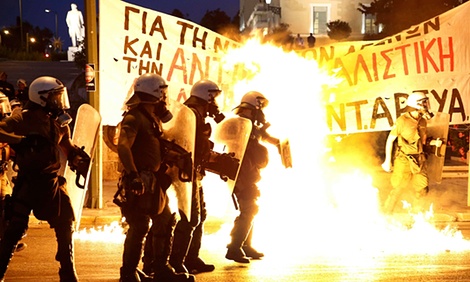-

-
Statement of the President of the Commission of the Bishops’ Conferences of the European Union (COMECE), Reinhard Cardinal Marx, on the Greek crisis.‘Long days and nights of nerve-wrecking negotiations lie behind us. The Greek crisis of recent weeks has preoccupied not only our political leaders but also each and every European citizen, living with the uncertainty as to whether or not the crisis would end with a positive outcome. I would like to express my gratitude to all who have committed themselves to pursuing the European integration project. Despite the unfavourable portents, all parties involved – the officials of the European institutions, the heads of state and government in the Eurozone and the Finance ministers – have not abandoned the pursuit of a common European solution. It deserves to be recognised that this successful outcome is the work of specific individuals whose personal commitment merits acknowledgement.The negotiations were tough, really tough. The stakes were very high for all those involved. There were grounds enough for engaging in a blame game. What is more important, however, is that we now look forward and think together about a common solution. The work ahead is daunting and can only be undertaken by Greece with the support of its European partners. The vast majority of Greeks want to stay in the EU and in the Eurozone. Moreover, the other member states too want to keep Greece in the EU. That the solution represents a classic European compromise is evidenced by the fact that in all EU countries the agreement was both welcomed and contested. All have a vested interest in an improvement in Greece’s economic circumstances and that the common European endeavour move ahead. It is thus essential that all Europeans concentrate on the common tasks and goals ; it is vital that they work on achieving them together.The most urgent task is the restoration of the trust lost in recent months. In order for any further steps to be taken not only towards achieving economic and financial consolidation, but also for co-operation within Europe on other policy matters, states and governments must be able to trust one another. The classic prejudices and clichés which characterise discourse between European peoples, heightened as they have been by the overheated atmosphere of recent months, must be deconstructed and overcome. It is essential that all parties take steps to restore confidence and re-create a calmer climate in Europe, exploring a more constructive, common approach into the future.The Church has always followed the process of European unification with benevolent interest. With this in mind, I would like to express how happy I am that a European solution was reached by the heads of state and government and that neither the wider EU nor the Eurozone risks collapse. And yet numerous questions remain. Is the package of solutions proposed viable? Can Greece stand on its own two feet again after meeting the requirements imposed? How do we keep the needs of the poor and the dis-advantaged within our sights? I would like to encourage all European citizens to commit themselves to achieving success as a common enterprise. There are enormous challenges requiring a long-term strategy, and they can be met only by courageous and creative solutions. Up until now no serious attempt has been made to tackle the structural causes of the crisis. It has to be said, there is even more to be done: reduction of unemployment among the young, a common concern for refugees, the pursuit of peace in Europe (e.g. in Ukraine) and in our immediate neighbourhood (e.g. Near- and Middle-East).It is vital that we learn lessons from the events of recent weeks and that we draw conclusions from the crisis. The EU alone cannot tackle the wide range of issues which fall within the responsibilities of the heads of state and government. The EU member states have got to do more work on the bases of our economic and monetary union, while Europe needs a stronger political co-ordination in the areas of economic, financial and social policy. A new approach to economic and financial co-operation in the EU is essential to any return to a success free of the perpetually returning threat of a currency crisis or social conflict.The project of European integration and unity has brought its peoples peace, security and prosperity. These successes need to be protected and to be shared by all. Europe is a project of reconciliation, not of division. What is now required is that all Europeans come together so that we can carry this European project forward hand in hand.’ It is more than just a question of the Euro. It is a matter of re-kindling the European idea by setting new goals, by fresh commitment. The targets set at the moment the European Union was founded are far from being met. As Christians we commit ourselves to co-operating in making this project a reality, and we do so with profound conviction.’
Source: COMECE





